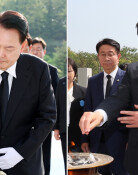Local government leaders threaten welfare default
Local government leaders threaten welfare default
Posted August. 30, 2014 04:17,
On Thursday, 226 mayors, and ward and county office heads across the country issued a statement suggesting, Welfare expenses including the basic pension and subsides for childcare costs are overburdening their budgets, and the central government is urged to devise special measures to supply finances at the national level. They threatened that unless the government increases financial assistances from the state coffers, they will declare "welfare default."
Local governments have reasons to protest. As the basic pension that pays up to 200,000 won (197 U.S. dollars) per month each to senior citizens aged 65 or older was launched last month, the local governments are forced to pay 1.8 trillion won (1.78 billion dollars) out of total 7 trillion won (6.9 billion dollars) this year and 2.6 trillion won (2.56 billion dollars) next year. The local governments are also set to pay 35 percent of 8.9 trillion won (8.78 billion dollars) in this year`s free childcare expenses for children aged 0 to 5. The basic pension and free childcare are part of President Park Geun-hyes election pledges. They have a point when claiming that while the central government is bragging about the measure, it has passed accompanying financial burden over to local governments.
While expenditures have increased, income from local taxes has declined due to a slump in the realty market, and a reduction in realty acquisition tax. The ratio of local governments fiscal self-sustenance fell from 51.1 percent last year to 50.3 percent this year, while local governments that spend more than half of their budgets on welfare increased from 10 in 2008 to 40 this year.
Since the government and ruling and opposition politicians raced to pledge free welfare services, a welfare default has been in store. In the last presidential election, the ruling Saenuri Party and the Democratic Party (currently the New Politics Alliance for Democracy) competed to make election pledges on such free welfare services as full health insurance coverage for treatment of four major diseases, and halving college tuitions. Implementing Saenuris election pledges is expected to cost an estimated 131 trillion won (129 billion dollars) for five years, while delivering on the Democratic Partys pledges is projected to require an estimated 192 trillion won (189 billion dollars). However they shunned preparing measures to mobilize resources, including a tax hike and restructuring of expenditures.
Even so, local governments are not very convincing either when they only criticize the central government while they waste budgets on pork-barreling pledges and demonstrative projects designed to show off. Yongin City in Gyeonggi Province wasted hundreds of millions of dollars on the construction of a luxurious city hall building and a light electric railway, which is lacking users. Due to severe fiscal shortages, the city cannot even afford to fix leaking roofs at schools. Taebaek City in Gangwon Province was on the verge of bankruptcy due to the construction of a large-scale resort complex, and its city-run development company barely managed to be put under court receivership on Wednesday for the first time among public corporations.
Due to low birthrate and aging population, welfare spending is set to snowball even without adding new expenditures. Korea already has more than 821 trillion won (810 billion dollars) in public sector debts. The central governments fiscal deficit is poised to increase further this year from 21.1 trillion won (20.8 billion dollars) last year. Ruling and opposition parties, the central government and local governments should conduct fundamental reexamination of overall welfare policies, and should reduce spending by sorting out things that are urgent from less urgent. If left unchecked, not only local governments but also the country as a whole could be forced to declare default.







